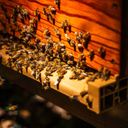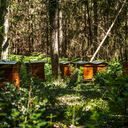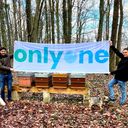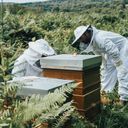
Sponsor beehives with your business
Make a positive contribution to biodiversity conservation by sponsoring beehives to protect the bees.

Invest locally for global impact
Local
Social
Measurable
How do our projects work?
Our ecologists take an inventory of the area and its surrounding flora and fauna as a basis for the pollination project.
We create an action plan with local partners and decide how many beehives we can install and if there is a need for flowering hedges.
We monitor the beehives and their environment to collect data that we can share with you to visualise your positive impact.
They’ve committed to pollination
Kuehne+Nagel
Kuehne & Nagel has partnered with EcoTree and supports various forestry and biodiversity projects in France to implement a CSR strategy that involves all its employees. So far, we have installed 10 beehives and planted melliferous hedges through sponsorship from Kuehne & Nagel. That work provides a rich forest environment for bee colonies.

Cora
A May 2022 round-up campaign was set up in 61 Cora shops across France, in partnership with MicroDon. Customers could choose to round up the total of their purchases. The money raised was used to set up various biodiversity restoration projects. For example, 10 beehives were financed in the Châtelain forest, with a monitoring system to track the environment of the apiary.

OnlyOne
Through their partnership with EcoTree, finance app OnlyOne offers their customers the opportunity to support biodiversity when they open an account and when they make purchases. With each transaction, a portion of the fees is donated to EcoTree to support various biodiversity projects, which enables the financing of the Pézarches forest apiary.

Adova
Adova chose to sponsor a beehive and the planting of a melliferous hedge in a forest managed sustainably by EcoTree. Through this partnership, Adova wanted to materialise their commitment to the forest and preservation of its ecosystems, while raising their employee’s awareness.

Learn more about beehive sponsorship
Why is pollination and bee conservation important to my business?
Indispensable for pollination, bees are directly responsible for the production of 80% of our food crops. If we don’t have bees, it will not be possible for most of our plants to reproduce. According to a report by the IPBES (The Intergovernmental Science-Policy Platform on Biodiversity and Ecosystem Services), run under the UN, more than half of the world's GDP depends on nature (€40,000 billion). Companies can reduce their impact on pollinators by sponsoring beehives and bee conservation.. The report also states that "land use, intensive agricultural management and pesticide use, environmental pollution, invasive species, pathogens and climate change" are the main causes threatening the diversity and health of pollinators.
How do you decide how many beehives to install?
Not all of our forests need beehives and we carefully make sure that honeybees do not compete with wild bees and other pollinators in the area. However, some of our forests do have the right tree species and flora to accommodate beehives. These beehives allow the pollination of flowers that cannot reproduce without the services of insect pollinators. In our sponsorship offer, beekeepers look after the apiary for two beekeeping seasons. At the end of these two years, you can renew your partnership. Our offer is adapted to your budget and at the same time, it meets the needs identified by beekeepers, foresters and scientists.
What happens to the harvested honey?
In 2023, we donated 3.4 tonnes of honey collected by our beekeepers to the food aid Restos du Cœur. It is essential, in our approach, that the activities we carry out in favour of nature also have a positive impact on our society. That means that when you commit to sponsoring a beehive and bee conservation, you are supporting an entire value chain. That’s from backing local beekeepers to solidarity investment, including the restoration of biodiversity.
How can I go further to support biodiversity conservation?
You can indeed make a difference by sponsoring beehives, but it is always a good idea to couple it with other activities. That way you consider the preservation of biodiversity as a whole and see your commitment to protecting bees and bee conservation in the context of a global ecosystem. If you’re sponsoring beehives, you may also choose to support the restoration of wetlands that will allow bees to thrive in their natural habitats. Bees need both melliferous flowers and water sources within 3 kilometres of their beehive to survive.